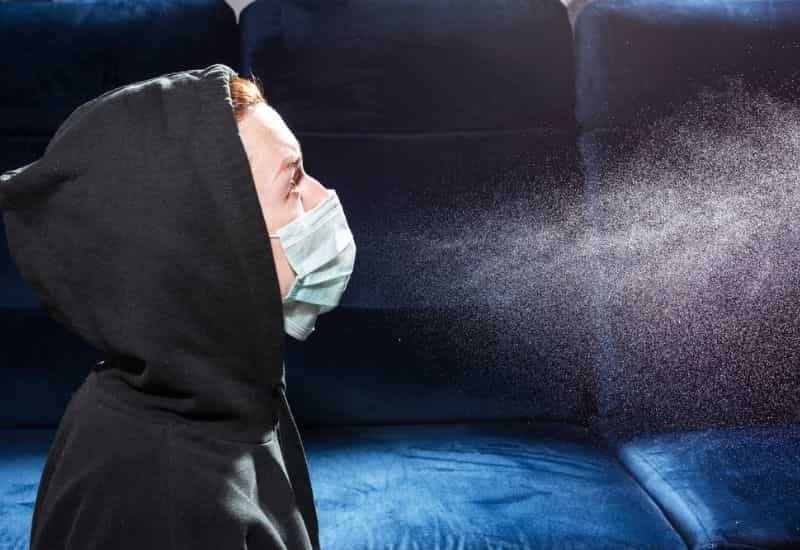Are you feeling under the weather and wondering if your strep throat is contagious while wearing a mask? Strep throat is highly contagious and can be especially dangerous if left untreated.
Strep throat is one of those illnesses, though with modern medicine and preventative care steps, you can significantly lower your chances of getting sick or passing on an infection.
In this blog post, we’ll answer your questions. Is strep contagious with a mask? What causes strep throat, how it spreads, and what precautions can be taken to limit its contagion?
Table of Contents
ToggleUnderstanding Strep Throat?
Strep throat is an infection which caused by a bacteria called Streptococcus pyogenes. Strep throat can be highly contagious and can spread through contact with saliva or mucus when the infected person coughs, sneezes, talks, or shares food or drinks.
Strep throat is common in children ages 5 to 16, although anyone can become infected. It tends to be more severe in adults than children and can lead to complications like scarlet or rheumatic fever if not treated properly.
Symptoms of Strep Throat
Most symptoms of strep bacteria infection are matched with the upper respiratory system. That is why it can be diagnosed in the same way as streptococcal infections.
The most common symptom of strep throat is a sore throat that can last several days. Other symptoms include:
- Fever
- A tiny red bumps on the roof of your mouth
- Swollen lymph nodes in the neck
- Red and swollen tonsils
- Difficulty swallowing
- White patches or streaks on the back of the throat or tonsils
- Loss of appetite
- body aches
- Vomiting or nausea
- Headache
How a Strep Throat Spread?
Strep throat is highly contagious and can spread quickly from one person to another. It is most often transmitted through contact with saliva or mucus, either directly or indirectly, when an infected person sneezes, coughs, shares food or drinks or touches an infected surface like doorknobs, toys, or other objects that have been in contact with the infected person’s saliva or mucus.

Strep throat is more common in children than adults and can cause serious problems if not treated in time. School-age children are some of the most effective spreaders of this infection. Due to close contact in schools and daycare, up to 30% of children with sore throats may have strep throat.
Is Strep Contagious with a Mask?
Yes, strep throat is still contagious with a mask. While masks can help by reducing the spread of illnesses like strep throat but not provide complete protection against infection.
Researchers found that wearing a mask reduces the risk of spreading respiratory droplets. (a small and light enough that if we are close to another person without a mask, we can inhale their respiratory droplets) and aerosols from an infected person to others in close contact.
However, it is important to note that masks are not 100% effective against spreading infection and should always be coupled with other preventative measures such as social distancing, frequent handwashing and avoiding contact with people who may have been infected.
How to Prevent the Spread of Strep Throat?
The spread of strep throat can be prevented by taking the right preventative steps. Here are some tips that can help reduce your risk of getting and spreading strep throat:
- Wash your hands with the soap and water for 20 seconds at least.
- Avoid close contact with people who have been infected.
- Prevent the spread of germs by frequently disinfecting high-touch surfaces like doorknobs and toys.
- Doctors usually prescribe penicillin or amoxicillin (Amoxil) for strep throat. It’s important to take all medication as directed by your doctor to prevent spreading the infection to others.
- Stay home if you are feeling unwell or experiencing any symptoms of strep throat.
Following these tips can greatly reduce your risk of contracting or transmitting strep throat.
Treatment options for Strep Throat

In most cases you don’t really need to head on to the doctor for treatment of strep throat, and it can easily be treated by antibiotics.
Here are some treatment options that your doctor may prescribe:
- Antibiotics: A course of antibiotics your doctor prescribes is typically used to treat strep throat infections.
- Pain relievers: OTC pain medications such as ibuprofen or acetaminophen can help reduce the soreness and discomfort of sore throat.
- Soothing Throat Lozenges: Sucking on lozenges that contain menthol, eucalyptus, or peppermint can help soothe a sore throat and provide relief.
- Gargles: Warm salt water gargles may provide temporary relief of the soreness in the throat by reducing inflammation.
- Tonsillectomy: In some severe cases, a tonsillectomy (surgical removal of the tonsils) may be recommended by your doctor.
It is important to talk to your doctor about the best treatment option and follow their advice.
Advice if You or Your Child Has Strep Throat
Srep throat can make anyone feel miserable, but most of the time it’s easily treatable and improves quickly.
Dr. Ruff shares this advice:
- See your doctor if you have a fever for more than five days.
- Call your doctor if you are on an antibiotic and don’t feel better within 48 hours.
- If you are diagnosed with one illness, it’s important to ask your doctor about additional tests for other possible infections in your community.
When to see Your doctor
If you are experiencing any of the symptoms given below, it is important to seek medical attention as soon as possible:
- Severe sore throat that lasts longer than 48 hours
- Fever of 100°F (38°C) or higher
- Difficulty in swallowing or breathing
- Swollen lymph nodes in the neck
- White patches on the throat or tonsils
Seek your doctor for more information if you have any questions or concerns about strep throat.
Conclusion
In conclusion, by taking steps to reduce the risk of getting and spreading strep throat is important. Wearing a mask can reduces the risk of spreading strep throat compared to not wearing one.
To reduce your risk of spreading strep throat, make sure you fit your mask properly and stay at least five to six feet away from anyone who may be contagious.
It is important to take preventative measures such as frequently washing your hands, avoiding the close contact with infected individuals, and following prescribed antibiotics.
Suppose you experience any symptoms or think you may have been exposed to someone with strep throat. In that case, it is important to seek medical attention to reduce the risk of complications or further spread of the infection.
FAQ
How long does strep throat last?
Strep throat usually takes about 2-3 weeks to fully resolve. However, symptoms can last longer if left untreated. It is important to take antibiotic treatment as prescribed by your doctor in order to reduce the duration of the infection.
Does vaping make strep throat worse?
No, vaping does not make strep throat worse. While there is research that suggests vaping can increase the risk of lung infections. It has not been linked to an increased risk or severity of strep throat.
However, vaping may decrease your natural immunity and make you more sensitive to infection. Therefore, avoiding any potentially harmful habits that could compromise your immune system and increase your risk of disease is best.
Can strep throat go away by itself?
Yes, strep throat can go away without treatment in some cases. It’s important to note that if the infection is left untreated, it can still cause complications like rheumatic fever or kidney inflammation. It is also possible for a person with strep throat to become contagious again after their symptoms have subsided.




